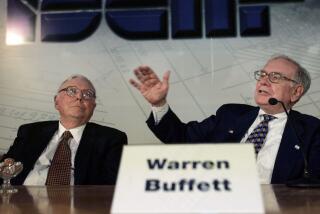Buffett’s take on sub-prime
- Share via
OMAHA -- — Billionaires Warren E. Buffett and Charles T. Munger say the pain many financial institutions are feeling because of the credit crunch is well deserved.
The chairman and vice chairman of Berkshire Hathaway Inc. said Sunday that the financial companies that engineered sub-prime mortgages and the investment funds that bought securities backed by those mortgages didn’t deserve much sympathy for their subsequent losses.
The current financial crisis is a byproduct of a system that encouraged executives to “paint pretty pictures,” Buffett said.
Munger said lots of financial institutions acted with stupidity and overreached to improve earnings in recent years. “I think you have to start with the idea that a lot of the current troubles are richly deserved,” Munger said.
Buffett and Munger spent nearly three hours answering reporters’ questions Sunday at their only planned news conference of the year. It is one of the events surrounding Berkshire’s annual shareholder meeting that attracted 31,000 people to Omaha this weekend.
The complexity of the tactics that financial institutions often employ makes it difficult to determine what those companies are worth -- even for Buffett.
“There are some financial institutions I can’t value,” Buffett said.
Buffett said the pain wasn’t over yet for financial institutions, but he said nobody could predict how many more times banks would have to write down the value of their assets.
The largest U.S. bank, Citigroup Inc., alone has taken more than $45 billion of write-downs and credit losses since June 30.
Buffett reiterated that he believed the U.S. economy was in a recession by his definition, even if it hadn’t yet met the commonly used criterion of two quarters of negative growth.
He said his definition of a recession was when most people and businesses were not doing as well as they were three, six or nine months before.
“I would say that we’re in a recession clearly,” Buffett said.
He said the Federal Reserve’s bailout of Bear Stearns Cos. probably prevented a crisis among investment banks because Bear Stearns held a large number of derivative contracts with other investment banks. If Bear Stearns went bankrupt, all those derivatives would have to be valued at zero or unloaded quickly.
But he and Munger agreed that not every business or investment bank should be rescued, because failure is an important part of capitalism.
“Capitalism without failure is like Christianity without hell,” Buffett said.
Berkshire owns more than 60 companies including insurance, clothing, furniture, jewelry, natural gas and candy companies, restaurants and corporate jet firms and has major investments in such companies as Coca-Cola Co., Anheuser-Busch Cos. and Wells Fargo & Co.
Through 2007, Berkshire had grown 21.1% a year since Buffett took over what was a failing textile maker in 1965. That is twice the gain in the Standard & Poor’s 500, including dividends. A Berkshire share that fetched about $12 in 1965 captures $133,600 now. A Class B share costs 1/30th as much.
Berkshire has become a behemoth, with a roughly $207-billion market value and $281-billion asset base that makes it harder for any one business or investment to move the needle.
Shareholders, including new ones, seemed understanding.
“I think it’s a steady stock. That’s why I bought it,” said Jane Hoffer, 53, a middle school cafeteria worker from Lincoln, Neb., who said she bought her 11 Class B shares in the last year. “I want something I can buy and keep and know that it’s not going to go bad.”
Buffett and Munger spent five hours fielding questions from shareholders. One, a 9-year-old boy, asked if they would buy the Chicago Cubs baseball team from Sam Zell’s Tribune Co.
Buffett said, in so many words, no.
More to Read
Inside the business of entertainment
The Wide Shot brings you news, analysis and insights on everything from streaming wars to production — and what it all means for the future.
You may occasionally receive promotional content from the Los Angeles Times.










